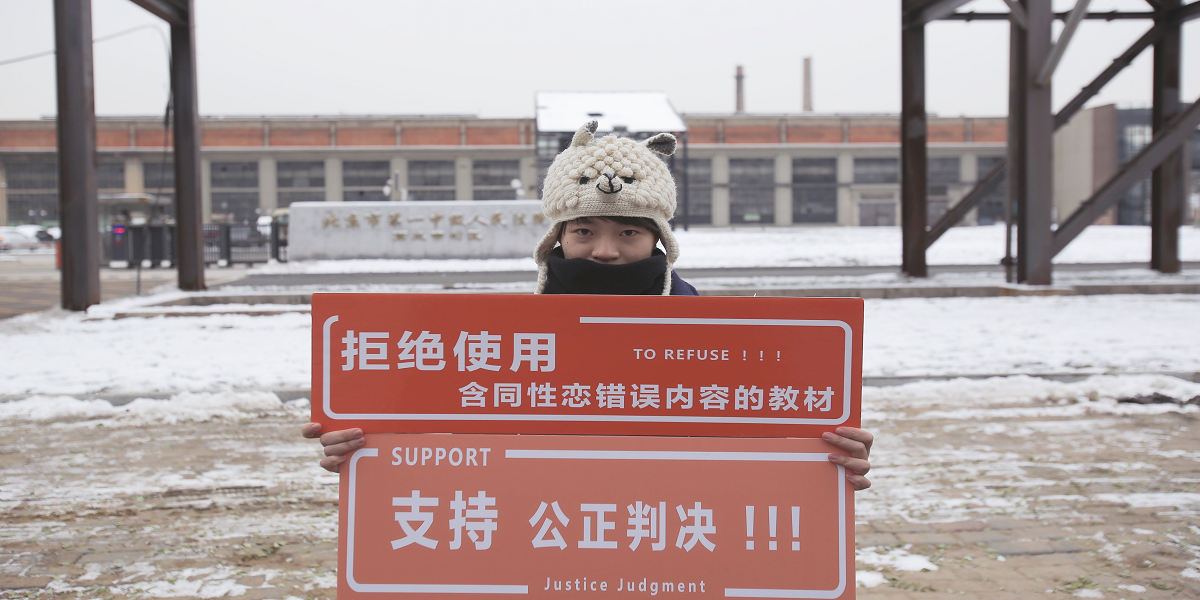On 16 July 2021, 18 LGBTQ+ public accounts run by the members of ‘underground’ student rainbow societies were shut down by WeChat. These accounts now only appear on the app as ‘unnamed’. When supporters voiced their anger about the closure on social media, their posts were swiftly deleted and some of their accounts were also shut down.
The closure of LGBTQ+ led social media accounts marks another turn in the long-term suppression of grassroots LGBTQ+ groups by public authorities in China. It is a concerning time for queer activists. How can we possibly promote LGBTQ+ rights in this context? How can we forge a space for ourselves in a society dominated by cisgenderism and heterosexuality?
Censorship on campus
I enrolled for undergraduate study at Sun Yat-sen University which, in 2006, set up the first rainbow society in mainland China. The university offered a public elective course on ‘social culture and gender diversity’, it had a ‘vagina monologues’ group, and so on. Despite the fact that these courses and groups were banned from campus by the university, those stories like seeds, were planted in my heart already.
In 2014, as a fresher, I discovered that the textbooks used in school described homosexuality as a form of mental illness. Although homosexuality has been removed from the list of mental illness in 2001, there were still plenty of stigmatised depictions of homosexuality and bisexuality in psychology, mental health, and medical textbooks published in mainland China.
The descriptions in these books typically stated that ‘homosexuality represents a sexual orientation disorder’, ‘being bisexual means being homosexual while being heterosexual at different occasions’ and ‘being gay degrades social morality.’
The ‘Say No to Homophobic Textbooks’ campaign was a brutal process
I decided to push for the correction of these homophobic texts. After failed attempts at engaging with editors, publishers and librarians, I chose to purse change through the courts. I sued the Chinese education ministry three times between 2015 and 2017, and tried to sue individual publishers on a number of occasions.
The ‘Say No to Homophobic Textbooks’ campaign covered my entire undergraduate course and was, at times, a brutal process. College leaders would often scold me for damaging the university’s reputation. Public repudiation of my actions by university leaders became a routine experience. The university even pressured my parents into silencing me.
Equal representation in textbooks is an important step in increasing LGBTQ+ visibility. Each textbook matters, each small progress matters. Through continuous lobbying and advocacy, the number of editors willing to make changes is growing and allies’ network is expanding.
International action
The recent WeChat incident has led to some discussion that there is no hope for the LGBTQ+ movement in China. I disagree with these views. While, to some extent, I have no hope that the public authorities will guarantee equal rights for LGBTQ+ citizens, I find hope in fellow activists pushing for change. For every closed account, there is a new online forum or space for LGBTQ+ activists and allies to organise and raise their voices.
After my undergraduate degree, I moved to the UK to further my studies. In a completely unfamiliar environment away from my previous support and social networks, it’s easy to feel disconnected from the LGBTQ+ movement that’s been such an important part of my life. Occasionally though, I hear about a friend that has been by the police or a media outlet experiencing censorship, and the desire to take action remains strong.
Eventually I set up Queer Chinese Network (later Queer China UK), which aims to mobilise queer Chinese communities overseas and facilitate cross-culture communication. Queer China UK is a space for Chinese LGBTQ+ communities to gather, organise and energise each other. We hope to run a queer Chinese exhibition in a university library in London soon and have been fully supported by the institution at hand – a novel experience given our experiences in mainland China.
In just two years, Queer China UK has had a very significant impact. Firstly, we have created a safe space for the queer Chinese diaspora in a predominantly white society, where we can share our personal worries or public issues in our mother tongue. This has become particularly important in the context of the Covid-19 pandemic which has seen a spike in anti-Asian hate crimes.
Secondly, we have provided opportunities for connection, mutual understanding and support, where we meet and collide with new possibilities for change. Finally, we provide resources and look to inspire and empower those that want to make change.
Even where same-sex marriage has been legalised, LGBTQ+ activists still work tirelessly to provide community services and advocate equal rights
Moving abroad can be a daunting prospect for many queer Chinese people. It is clear that the UK is one of the safest options and Queer China UK has enjoyed working with local allies, learning about their long struggles for equality and the obstacles that still remain.
It has become clear to me that even in countries where same-sex marriage has been legalised, LGBTQ+ organisations and grassroots activists are still working tirelessly to provide community services and advocate equal rights.
Every year in LGBT History Month and Pride Month, rainbow flags fly across the UK and yet, at the same time, there are queer people who are beaten on the street. In September 2021, Switzerland became just the 30th country in the world to legalise same-sex marriage. There remains a long way to go before attitudes change and queer people are free to live without fear of violence, discrimination or prejudice.
It is important, therefore, that we continue to resist and speak up where we can. It doesn’t matter if it is on campus or off campus, in the UK or China. My activism has given me hope and allowed me to find myself in a repressive environment. I hope that experience can be shared with others in the LGBTQ+ community.










